
Full of vitality, vigor & inspiration. Love & passion apart from clichés - tender, true & touching
Wonderful. Just wonderful. A highlight among the KDramas of 2022.I would rate it "particularly valuable". On all levels. Right down to the soundtrack.
The story has a stimulating, inspiring, at times downright thrilling effect, above all thanks to a brilliant Kim Tae-ri. She was 32 at the time of shooting, but effortlessly she plays a teenager with an ambitious dream of her own in times of adversity.
"Twenty-Five Twenty-One" is packaged as a teen story told in two timelines. Then and now. The protagonist from back then is today's mother. Today she is at odds with her daughter, who wants to give up her ballet career. In her grandmother's house, the rebellious teenager finds access to her mother's youthful past, who in turn also had difficulties with her mother at the time, yet courageously pursued her dream of becoming a fencer on the national team.
Romantic feelings are inevitable as the story progresses. Yet this storyline develops quite idiosyncratically beyond expectations, not least because of the two timelines told in parallel. Here, Love is shown more in the quality of an inspiring, encouraging, empowering 'rainbow', as the two protagonists so nicely state. It's a shame that you can't leave love like that, but sooner or later want to capture it, tie it down and pack it into a rather common concept of 'partnership' - with all the expectations and disappointments that come along with it...
"Twenty-Five Twenty-One" doesn't see itself as a Rom+/-Com fairy tale. From the start, it's not a fairy tale. Here the goal in life isn´t the happy-ever-after-family-life as such. It tells about what it means to have a dream and to follow it courageously, even if you wonder why at times. It talks about following your own precious heart, even if it might break the hearts of others in the process. It tells of passion. And of love in its very different shapes and sizes. "Twenty-Five Twenty-One" has its unique focus on love in a very tender, true and touching way - apart from clichés. It's about romance as a formative force in life, yet the story doesn't focus on glorifying romance.
In fact, the story is full of vitality, vigor, hope and joie de vivre in the face of one of the worst post-war economic crises South Korea has gone through.
In this respect, the KDrama also offers an explicit insight into the social and societal effects of the economic crisis of the 1990s.
(So here's a also side note on that context, if you are interested.)
-------------------- SIDE NOTE: ---The Asian crisis of the 1990s, the structural adjustment program of the International Monetary Fund (IMF), and the nationalist sentiment of the people that paved the way for South Korea's neoliberal globalization---
In the course of the Asian crisis, the IMF implemented its structural adjustment (SAP) in South Korea from December 1997 to December 2000, which is still considered a great success today. Others say the rise is due to the people's disciplined national consciousness. However, the massive economic slump that South Korea experienced in the vortex of the Asian crisis is undisputed. Neighter ist the impressively successful recovery since 1999.
After international investors withdrew their loans in the face of the uncertain crisis situation on the Asian continent, South Korea fell into a balance of payments crisis. This is where the IMF came into play, putting together its most comprehensive rescue package to date, with bailout loans totaling around USD 58 billion. The condition: the country was to fulfill an SAP program for three years: In addition to a consistent policy of high interest rates, government austerity measures, complex capital market liberalization and the restructuring of the financial system were required.
As a result of the balance of payments crisis, numerous banks had already filed for bankruptcy or had been nationalized. Due to the IMF's high-interest policy, countless corporate insolvencies followed in the first three months of the SAP, including some Jaebeol conglomerates. South Korea paid the price of its economic boom of the past decades, which was founded on high debt and growth rates. Unemployment tripled. Gross domestic product fell by 6.7 percent within a year.
The impressive recovery that has followed has been possible at the expense of the general population. South Korea's rapid return to the top positions in the world market is a special case worldwide, which was probably achieved less by the SAP of the IMF than by the nationalistically highly motivated South Koreans. They have written the possibly questionable, but at the same time fascinating economic success story on their backs.
First: People became victims of far-reaching processes of rationalization and concentration. On the one hand, this led to mass redundancies and, on the other hand, to a more flexible labor market. Many of the demoralized unemployed didn´t even try to find their way back into the world of work anymore. Others were employed as irregular temporary workers (e.g. with less pay, security and rights). After the crisis, these ´irregulars´ made up more than half of the workforce and their share still is far higher than in other OECD countries.
Second: The benefit of a very unique South Korean nationalism motivated many people to be willing to make personal sacrifices: they consciously avoided consuming imported goods, while at the same time the export of their own goods increased significantly. The need for foreign capital for the upswing is actually estimated at only 5 percent. The share of exports in GDP increased from 25 percent in 1996 to 41 percent in 1998. 95 percent of the net inflow of foreign exchange during the lifetime of the SAP came from the current account surplus. This was made possible by a disciplined population, who did not try to storm banks in a mass panic, but were even willing to exchange their private currencies and savings themselves, including in large gold collection campaigns, in favor of the national reserves in the weak national currency.
The macroeconomic success that has grown out of this nationalist attitude at the expense of the population is enormous. Many lost their jobs and their fortunes. Nevertheless, the South Koreans mostly got involved in the Buy-Korean campaign and avoided imported consumer goods. I.E. incidentally, the market share of South Korean films in cinemas has increased in this context from 23 percent in 1996 to 50 percent in 2001. (An aspect that also gets its own space in this KDrama...)
-----------------------------------------
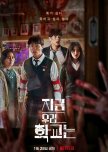
In spite of all the horror and struggle for survival, there is still room for the heart note
"All of Us Are Dead" isn't specific to South Korean culture, but it's not surprising that the story was born on South Korean soil... The story picks up on the sheer horror that South Korean youth are exposed to in the face of their brutal educational system. There, the enormous pressure to perform is higher than almost anywhere else in the world. For some, bullying is one way to reduce stress. The bullied, in turn, are doubly stressed. Other options include withdrawal, drugs, or suicide. South Korean society is largely blind and/or helpless in the face of this. The pressure to perform and, in this context, the psychological suffering of young people seems to be without alternative in view of the nationwide (and worldwide, economic) competition - a price that society has to pay in view of the greater good. And with that, the youngsters are left alone to somehow survive in this merciless world. However, this applies (perhaps not so blatantly) in a similar way to young people in many countries around the world.This is where "All of Us Are Dead" comes in its impressive and striking way.
The original title is something like "Currently at our school", so the focus is actually on the school and their students. In fact, the horror of everyday school life, which is more existential for some and less existential for others, mutates into a horror for everyone. A troubled father wants to create a way for his suicidal son to finally stand up to his bullies. The experiment goes astray. The vicious, zombie-like virus is sweeping the entire city and beyond. Disaster control, state of emergency, martial law - the whole program is needed to get the situation under control. And here, again, the young people are left alone in their existential need.
The story telling and expression of various group and relationship dynamics between the young people represent high-end KDrama quality - intense, powerful, sensitive, excellent. Almost everything is on the table. For me, this is the strength of this KDrama and the reason why worth watching.
Besides the problems, dynamics and approaches of trying to 'master' the threatening epidemic somehow sums up what we have had to go through worldwide in the past 2 years marked by Covid. When the rules are overridden, individuals (those who happen to have something to say) rule against the backdrop of their (helpless) personalities - arbitrary or scientifically based, rational or irrational, mostly driven by fear and from a safe distance and/or on the (argumentatively) safe side. Then real quick nobody takes side of individuals anymore, the big picture being more important...
Seen in this way, "All of Us Are Dead" is a qualitatively demanding KDrama in several respects. In spite of all the horror and struggle for survival, there is still room for the heart note.
However, I would like to emphasize that the virus is turning people into flesh-eating zombies. So the abundance of screaming, rattling, biting, blood-smeared zombie scenes, which simply lack any aesthetics for the eye and ear, is part of the story, too. In general this drama is brutal. This is obviously very popular in the international zeitgeist and thus (being published on the international netflix platform) stagily staged. I would say, brutal details and zombie-screentime could definitely have been less prevailing (in order to still tell the story).

A story full of humanity in the face + despite blatant inhumanity. An epic about love & compassion
"Eyes of Dawn" marks a quite spectacular milestone for South Korea Television Series as well as the kick off for a new era of TV production – ambitious in terms of time sensitive content as well as an artistically valuable approach. The production dates back to 1991… South Korean life is just cautiously starting to be a bit less suppressed."Eyes of Dawn" is the creative script and cinematic processing of a novel, which deals with the tragic relationships of the three protagonists Choi Dae-chi, Yoon Yeo-ok and Jang Ha-rim as well as the bitter history of their time. The story takes place during the Japanese colonial rule, during the last years of the second world war and reaches up to the liberation of Korea and the time of the Korean War.
The KDrama begins its story during the last years of World War II – with Yeo-ok, a comfort woman, who like cattle is being shipped to northern Manchuria, and Ha-rim, who is drafted into the military as a student. Yeo-ok meets and falls in love with soldier Dae-chi, while serving as a comfort woman for his Kwantung Army unit. (With Ha-rim she only meets much later. )The world war and the subsequent struggle in Korea for a new political identity grind the three protagonists mercilessly through somewhat traumatizing mills. Love and passion accompany the three on their dramatically entangled paths, where they sometimes meet, sometimes separate, meet again and separate again within the turbulent swell of their time. Showdown is during the Korean War at Jirisan Mountain – in the ´eyes of dawn´…
For this KDrama MBC spent a lot of money – more than 5 times as much, compared to other TV series. It was shot at original or similarly exotic locations abroad. (If you like, see also the side notes below.) The project feels more like an approx. 36-hours-long movie. With "Eyes of Dawn" MBC celebrated its 30th anniversary with a bang, so to speak. The KDrama was enthusiastically received by the audience. For director Kim Jong-hak, "Eyes of Dawn" was the breakthrough. The former journalist came to MBC in 1977 and worked his way up the ranks with historical dramas in a politically turbulent time full of rapid changes (in series production, too). However, "Eyes of Dawn" is his first truly self-responsible of two innovative, groundbreaking masterpieces (the other being "Sandglass"). Thus, Kim has unsparingly reappraised the latest history of his country and his compatriots with a confident original signature and thorough, artitistic determination. At his side, screenwriter Song Ji-na provided a well-rounded, coherent script with depth and complexity. A team of talented actors and an intensely lingering soundtrack rounded off the ambitious projects with a high entertainment value.
Fantastic actors. The three leads in particular, but not just them. This applies to everyone else – there were an impressive 270 actors as well as around 21.000 supernumeraries involved...
"Eyes of Dawn" and "Sandglass" are actually both (in contrast, for example, to the younger KDrama "Faith or The Great Doctor", which Kim Jong-hak also had directed) reduced to the essentials when it comes to dialogues. Passionate, but also ruthless in the authenticity of sometimes ugly, even brutal details. Gross and austere, yet visually stunning, too. With selected camera angles that often say more than words, and scenes, that burn into your memory. The KDrama wants to show life as it was, back then... 'Nice' is rare. Sincere it is, though. Serious. A great piece of series culture. A dream of a historical drama, aiming at bringing history to consciousness in a memorable, authentic way. Thus, what happened is not forgotten. It is a cinematic monument: Take a look! Feel it! Recognize what happened! Estimate! (Too bad, it's not widely circulated with at least English subtitles... however, apparently there's a musical now... well... let´s hope.)
The story offers merciless insight into the suffering of the comfort women who, even as teenagers, were often brutally physically abused for the pleasure of the Japanese soldiers – a war crime that has not been adequately investigated and atoned for to this day. In principle, people of Chōsen were systematically oppressed back then. The Chōsen soldiers in the Japanese army, thus also had a particularly hard time, as the KDrama bluntly shows, too. And then there is the turmoil and ruthless brutality of diverse war sites in inhospitable locations around the Pacific Ocean, and later between brothers and sisters as the Korean Peninsula was coldly caught by the increasing Cold War. With the uprising on Jeju-do becoming part of the story, an up until then rarely discussed aspect of the late 1940s comes to mind. As well as another, often suppressed war crime that Japan had committed against its international prisoners in connection with Unit 731: mostly deadly ending medical experiments on several thousand men, women and children in one of the coldest places on earth, in northern Manchuria. (In case you didn´t know, you may see the side note below.)
But "Eyes of Dawn" is also a story full of humanity even in the face and despite all blatant inhumanity. An epic about love, friendship, connection and compassion. There were plenty of awards. I line up there. This KDrama production is particularly valuable…
(...especially from a historical point of view for me as a European. Although I did take history as an advanced course in school, I somehow had never considered a lot of these events and topics really seriously before. But even beyond its historically enlightening ambitions, "Eyes of Dawn" consistently and purposefully tells a powerful story about three (ordinary) people of their time and their tragic fates, complexly woven into an emotionally touching love triangle.
(For the sake of completeness: as this KDrama is from 1991, visual and acoustical quality obviously can´t be compared to recent standards...)
----------------------------------------
SIDE NOTE
--- Some background information on the Pacific War and the filming locations at the original historical locations ---
- War sites on the Chinese Mainland – Northern Manchuria
World War II began in Asia with Japan's invasion of China in 1937. The Second Sino-Japanese War was fought almost exclusively on the Chinese mainland until the end of 1941. Only with the Japanese attack on Pearl Harbour on December 7 in 1941 did it spread to the entire Pacific and had the US allies also intervening in the war against the massive Japanese expansionist policy. Thus, in the course of 1942, the balance of power shifted towards the USA. However, the warfare was difficult. The scenes of the battles were often in impassable swampy areas and rain forests, where tanks and heavy artillery could not be used. So there was a lot of fighting in the air and on the water. In November 1943, the Soviet Union also opposed Japan and opened a second front in Manchuria. The air for Japan was getting thinner and thinner. The army motivated their soldiers by employing 'comfort women', practically forcibly recruited from their colonies, who accompanied 'their' troops as sex slaves and had to ensure their good morale. Among them were minors, too (like the fictional Yeo-ok).
- In the jungles of Burma
In its large-scale campaign to conquer all of Southeast Asia, after the effective invasions of the Philippines, Indonesia and Malaysia, Japan was also able to take Burma in the spring of 1942. China was thus cut off from supplies. Starting from Ledo in British-Indian Assam, the USA had an extra supply road built through Burma's jungle – the "Ledo Road". In the meantime, the Japanese troops were pushing the British further and further back into the north of Burma, ultimately driving them out of the country for good and even pushing forward into India in a further offensive. The Japanese army had now themselves fallen victim to the lack of replenishment with supplies. They originally only had food for three weeks. After that they had to see for themselves. (These jungle fights become the operational area of the fictional Dae-chi.) In this context, in 1944 the fierce hand-to-hand combats at Imphal and Kohima south of Ledo marked a turning point in the course of the Second World War as the British reinforcements arrived just in time.
- Saipan: Strategically important Mariana island in the middle of the Pacific Ocean
In mid-June 1944, the US Marines landed on the south-west coast of Saipan in the bitter struggle for the strategically important island chain of the Mariana Islands in the Pacific Ocean. This also becomes the setting in "Eyes of Dawn", because Ha-rim is stationed in the field hospital here and Yeo-ok was also shipped there as a comfort woman.
Three weeks after the US Marines landed, the heavily fortified island with its three airfields was owned by the Americans. From here, the neighboring island of Tinian could also be taken, from where the atomic bombers in the direction of Hiroshima and Nagasaki actually started about a year later.
- From Liberation of Chōsen to Korean War
The Japanese surrender in 1945 was followed by the liberation of the Chōsen colony. Contrary to the Western view of this 'liberation' of Korea and the role of the USA in supporting/forcing a democratic South, which for me as a German is more Western, in "Eyes of Dawn" you get a non-Western portrayal. The post-colonial struggle of the people of Korean origin for their political sovereignty, previously stolen by Japan, began even before the (rest of the ) world recognized it as the Korean War in 1950. "Eyes of Dawn" portrays the time of the tussle between the USA, Russia and China on the one hand and the search for a new national Korean political identity on the other. The KDrama emphasizes this in a dramaturgically moving way using the example of the fatal triangular relationship between Dae-chi, Ha-rim and Yeo-ok in the back and forth of their pro- and anti-communist agent activities and in the service of the army of the newly installed Republic of Korea on the one hand and those who resist this government on the other partisan army on the other hand.
----------------------------------------
----------------------------------------
SIDE NOTE:
--- Jeju Uprising 1948/49 ---
A notable sequence in connection with the resistance against the US-sponsored Rhee government is the April 1948 to June 1949 uprising on Jeju Island. The KDrama had its scenes shot on location. Just consider, that at the time of the uprising almost every family on the island had probably lost someone, but for decades silence was officially decreed about this mass murder launched by their own (new South Korean) government. Surviving 'activists' were banned from working throughout South Korea. "Eyes of Dawn" is one of the first public confessions and the cautious approach to coming to terms with the past with regard to that dark first chapter of this young republic.
The USA categorically rejecting any kind of communist orientation regarding a political future as South Korea or all of Korea, were faced with plenty of riots and guerrilla actions in the course of the national resistance against an (yet again) unwanted paternalism. The uprising on Jeju Island is arguably one of the most shocking examples. After expressions of dissatisfaction with the planned elections for the US-sponsored government and resistance to renewed foreign rule, the population was ruthlessly massacred by the Korean army and the help of the US-Army´s occupying forces. The people fled to Hallasan mountain area while their coastal villages (270 out of 400) were destroyed. There is disagreement about the number of actual casualty – the numbers vary between 27.000 and 140.000.
In 1991, when "Eyes of Dawn" was broadcast, this topic had not yet been officially dealt with – but with this KDrama the uprising got an unmistakable voice and recognition for the first time. It was not until 1999 that the government convened a thorough investigation. In 2006, the government officially apologized. However, police and the Department of Defense only came up with an apology recently, in 2019.
-----------------------------------------------
------------------------------------------------
SIDE NOTE:
--- Region of Harbin in northern Manchuria and Unit 731 of the Japanese Kwantung Army, which experimented with biological and chemical weapons on humans and then used those on civilians as well ---
Japan had already secured influence in northern Manchuria during the course of the first Sino-Japanese War by building the South Manchurian Railway. The valuable raw materials mined here were transported to Chōsen and shipped from there to Japan. The railway was under the protection of the Japanese Kwantung Army. Between the first two world wars, Russia, Japan and China fought for supremacy in Manchuria. Eventually, with the Japanese occupation of this economically viable region in 1932, they established the puppet state of Manchukuo, with Harbin being its largest city. Here was the stronghold where Unit 731, led by Ishii Shirō, began their spooky experiments. At last, after the end of war, between 1945 and 1948, the Communist People's Liberation Army, strengthened by its anti-Japanese resistance concentrated its forces in Manchuria.
Surgeon General Ishii Shirō and his Unit 731 were busy starting 1932 in and around Harbin with experiments on living people. Around 3.000 mostly bacteriologists worked for Unit 731. An estimated 3.500 mostly Korean and Chinese civilians as well as Soviet prisoners of war were victims of their cruel human experiments.
The experiments of the Imperial Japanese Army's secret Kwantung Army Unit 731, disguised as the "Department of Epidemic Prevention and Water Supply Department" laid the groundwork for a wide variety of horrific war crimes during World War II. Among this ´research´, for example, were investigations concerning varying effects of grenades on the human body depending on distance and position, investigations into the effects of bombs filled with a variation of bacterial powders, of pest bacteria or anthrax bacteria, or bombs filled with fleas being contained by such bacteria. It has been proven that Chinese prisoners of war were given food that was deliberately contaminated with typhoid pathogens. During the final years of the war, around 130 kg of anthrax warfare produced by Unit 731 was used to contaminate lakes, rivers and wells on enemy soil. Finally US prisoners of war were 1943ff used for experiments of Unit 731, too. E.g., for research about the susceptibility of 'white' people to epidemics. During the course of the war, another tens of thousands of mostly civilians died from rat induced epidemics of plague, of anthrax and of typhoid pathogens as a result of ´field research´ and by the use of thus produced biological weapons, based on the 'medical research' in Harbin.
And for further information:
Unit 731 always had the full support of later Japanese prime ministers, and the Japanese imperial family was aware of it, too.
The main perpetrators of Unit 731, including Ishii Shirō himself, ultimately remained unpunished after the war crimes trials – in exchange for the research results that they handed over to the USA.
----------------------------------------------------

Powerful in its authentic acting & realism combined with dramaturgical abstinence
Does love have an expiry date? Or is it we humans who persistently fail to create a living co-creation from the promising 'WE' for which Cupid's arrow once set the course? "Maybe we Broke Up" doesn't have an answer to that. But! In impressive dramaturgical abstinence, the KMovie encourages us to think about it."Maybe we Broke Up" is also known as "Someone you loved". It documents in fantastic realism the unspectacular 'ending' of a relationship – like so many others. Almost as if couples in crisis could have applied to a reality show, whereas the camera team followed one of them through this difficult time and also for several months beyond. Everything seems real and lifelike and familiar. At the same time dramaturgically abstinent with neither comedy nor jokes through embarrassment, nor suspense, nor eroticism, nor violence, nor action being staged to get tempers boiling.
The couple's relationship story takes its inexorable course. And the problem with this relationship is that it has lost all its appeal. Habit, everyday familiarity, and being taken for granted have taken the place of tingling love. Concepts, expectations and relationship dynamics, which are now well trained from behavioural patterns, keep the radius of emotional highs and lows in check. The KMovie is consistent in this respect and doesn't try to sugarcoat anything. The camera just stays on and the viewers stay tuned to the action. We don't get emotionally involved, we just watch. Maybe we take a stand for one or the other. But that's our business.
The film doesn't want to push us into any corner. It just wants to take us along. Documenting. And it doesn't actually tell us anything new: A relationship gets more and more out of balance. Actually speaking out about the situation eventually brings it all down. There is no turning back. The 'WE' has become two individuals again, who now have to sweep up their emotional shards themselves and thus get the chance to learn the best from their mistakes.
The power of "Maybe we Broke Up" lies in the authentic acting combined with dramaturgical abstinence. The author is also the director. He stays true to his idea. There is no evaluation. And it is precisely through this simple authenticity that the realistic story spirals so poignantly into the mind, leaving the audience with their own record - their thoughts, emotions, questions and well-known stories, be it their own and/or those of friends and/or relatives.
--------------------------------------------------------------------------------------------
Side note: ---- Gosi Civil Service Exam in South Korea ----
The civil service career has been a priority in Korea for centuries. It stands for social recognition, but even more for financial security, up to retirement. Since the 14th century, candidates for civil service have had to pass a state examination. There are nine levels of officials. For the lowest ninth level, all you need today is a high school diploma. The competition is massive. The ninth "Geup" is for those, who get accepted, the start. With years of service and performance, or a degree, the civil servants can then advance to the middle civil service career. But for a higher career up from the fifth "Geup" you have to take the "Gosi" admission test, which only takes place once a year. It is quite demanding, but can be repeated indefinitely. Needing several attempts is not uncommon (and the high demands of the exam are always a popular topic, even in KDramas).
The Gosi exam is only the door opener. After that, the training takes place. A degree is also mandatory for the upper Geups, especially law, economics or political science. Since civil servants are/should be the pillars of society, only the most talented citizens are traditionally selected for this. In fact, most of the top five Geup officials hail from one of the three elite SKY universities (Seoul National University, Koryo University, and Yonsei University). An enormous market for tutoring institutes has now grown, not only for the university entrance exams, but also for the Gosi exam. In these, the candidates are intensively prepared. For many, this means nothing other than: study and study even harder, period. For one year. The better the preparation, the better the chances. However, you can get a lot of support for a lot of money.
The Gosi exam wants to separate the wheat from the chaff. For some, money may help, for others, iron will power, diligence and a certain amount of talent/intelligence must suffice. This combined with a supportive social environment, because in that preparatory year (and possibly subsequent preparatory years) there is hardly time for part-time jobs and everyday obligations...
--------------------------------------------------------------------------------------
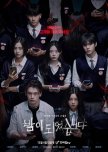
Terrifying.
And captivating at the same time.
Most peculiar.
First I wanted to quickly get out of it.
But then, somehow, I couldn't leave the girls and boys behind in their misery...
A nasty, cruel game with anguish and desperation.
And at the same time bitterly serious.
When bullying turns into a relentless, painful fight for survival...
An original but also creepy reckoning with the issue and impact of psychological and/or physical violence among teenagers.
Nurtured and inspired by what for some (far too many!) is real hell on earth.
In that sense: quite upsetting.
Therefore: ambitious and well done.
However: still scary.
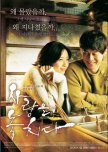
A homage to all those unhappily in love! (Wherever. Whenever.)
I´d say this is a homage to all those unhappily in love! (Wherever. Whenever.)Calm, like the water on windless days. Bare in words, instead told with images, well-placed scene settings and metaphors.
The protagonists are not so good with words, rather insecure and awkward when it comes to sharing their feelings. (But actually, nowhere in the movie is there any role model, whatsoever, from whom they could have learned better - how to deal with feelings openly, sincerely and appropriately.)
The original title was "Lost Love" or "Missed Love". But the international title “Lost in Love” is also appropriate, as the protagonists don´t seem to know how to navigate their feelings of love. This brings us back to the calm – becalm, with no wind to fill the sails. In fact, there is no tension between the protagonists - it is the drama of bad or missing timing in love. It is no coincidence that bus terminals become a structuring leitmotif.
The story of "Lost in Love" is not spectacular. On the contrary, it is the essence of a non-story. A story about a story that just doesn't want to happen. Nevertheless, it goes deep - because it relies on the effect of the blank, on the space between, on what works in the background and constantly gnaws at the heart. And this, actually, is an all too familiar, well known, painful experience for many people. It doesn’t have to be explicit. It is even more precise that way.
The KMovie has nothing to do with a typical RomCom. Nevertheless, "Lost in Love" is poetic in its own way - with an affectionate look at the unfortunate lovers on this earth: their hopes; their fear of self-confidently standing up for their feelings and thus maybe provoking the dreaded, outspoken “No!” or “Go!”; their inability to let go.
Water is the leitmotif in several ways. There is the rowing school and the fish farm representing dynamism and movement. And then there is the rain and the tears, shed or non-shed. But “Lost in Love” is also expressly colorful. With an eye for the banal details in everyday life. Authentic. Without makeup. The smell and the humid air of the monsoon summer are almost penetrating through to the audience. The landscape was handpicked, the radiant nature representing the beauty of life - even despite being unhappily in love.
The KMovie has its own idea of pacing. It develops its idiosyncratic charisma. It is the story about the non-love story, quietly told in a meandering way, as feelings are nothing one can be persuaded of... they can only be experienced... and, at best, shared... Or maybe empathized/sympathized with.
Immersive in its own way. Not for every mood. But if the timing (yes, again…) is right - for me it was a rainy autumn day - then (in my opinion) it's definitely worth seeing.
Others might say its dull and boring. Being from 2006, it is rather ´old´, too.
Well, check it out for yourself.
P.S.:
For the private lives of the ML and FL, though, it obviously worked out quite well.
They are married since 2009...

Thought-provoking KMovie, sailing close to the wind when it comes to duty of care and child welfare
The KMovie "Highway Family" is set at the bottom of the social pyramid in South Korea in the year 2022. It portrays a homeless family who seems to have found their own lifestyle at the country's highway rest stops. A happy family sleeping in a tent, living on scrounged money and having lots of fun together.That's one side of the medal. As audience, however, one cannot help but see the other side of the coin despite all the family idyll. The heavily pregnant wife has no medical support during what is now her third pregnancy. Her two children, being five and nine years old by now, miss out on any schooling. The parents claim that they do the teaching themselves, but reading, writing and maths are obviously not on their curriculum. A playground on the highway rest stops, which are heavily frequented by cars and heavy trucks, is dangerous, and the parents' duty of supervision is by no means guaranteed. The father is (as so often) the head of the family and objectively speaking, his decisions about the self-chosen outlaw family life sometimes border on violating his duty of care. Supposed (motorway rest stop) idyll and freedom may correspond to the father and his outlook on life. Wife and children, on the other hand, are now stuck in this boat. They love each other as a family and especially the children know no different. They rely on their father.
The KMovie sails close to the wind when it comes to moral issues concerning work, economy and society as well as duty of care and child welfare. Camps may form in the audience. And that is intentional.
The second protagonist, alongside the Highway family, is a married couple who lost their own child and who run a second-hand furniture store. Solid. Prosocial. Responsible. However, emotionally deeply wounded and unhappy.
Worlds clash. Two families meet. One is shattered deep inside, the other formally. Together they build something new - an alternative family patchwork, grounded in a rather simple normal life, which obviously doesn't have to be the worst, at least when kids are involved. Yet, can it be as simple as that? And at the disturbing end there is the question about the end of the story... which remains in the eyes of the beholder...
A thought-provoking KMovie.
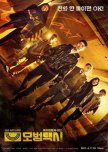
Being a victim in the face of injustice is the worst – revenge promises release of suffering
Dealing with some actual crimes in South Korea, "Taxi Driver" retells them from the perspective of the victims - a variation of vigilante justice is the driving force and explosive in the plot development. A lot of action is guaranteed. The pace is high. There's nothing tear-jerking about. Romance has no place here. However there is room for emotions.Although the crimes are extremely brutal and unscrupulous as well as the fights and chases don't sugarcoat anything - Taxis Driver is overall fun to watch (not in the sense of ´funny´ though!). On the one hand, this is because the perpetrators are caught and the victims actually get 'help'. On the other hand, and above all, it is the actors. Not only the team around Kim Do-gi, also and especially the individual villains in male and female versions. While on the one hand turbulent action fills the time (yes, for me personally less would have been more, but that's probably a matter of taste), it's actually the theatrical performance of the mimes that characterize the esprit of the series. The fact that Do-gi has to slip into new roles for his assignments has a certain charm - i.e. sometimes he mimes the inexperienced substitute teacher, sometimes the gallant, wide-legged criminal with a fur coat...
It's still quite a brutal TV serial. That's because of the cases. Yet they aren't invented. It helps that there is room for a pinch of humour, harmless situation comedy and a wink every now and then.
Despite all the vigilantism, which is the driving and fundamental premise of the entire series (and probably also of the 2nd season that is already planned), it is respectable: there is also a serious examination of justice/injustice, law/judiciary and the state's monopoly on the use of force. The brilliant public prosecutor Kang Ha-na in her idiosyncratic way and her team are excellently suited to this. The heroic deeds of the 'exemplary taxi crew' are thus not only whitewashed, but also rightly confronted. The script has in that sense hit a fine line that doesn't take away the joy of satisfaction, but still puts a question mark behind vigilantism, and thus gives credit to honest, committed and highly motivated law enforcement officers - because the country needs them. Vigilante justice, that should be clear, cannot and must not be the solution. (Human history is full of cultures of lynching and blood feuds - certainly this never did and will not promise a better world.)
And then: the heroes of the story are human beings, too. Flashbacks provide an insight into the taxi team's traumatic, formative past while tying them into current cases. They too are victims. On this earth there is probably hardly any person who does not have had the experience of being a victim in the course of their life - more or less traumatical. It is an ugly feeling, a deeply shameful experience, as it reminds mankind of its greatest weakness: the ultimate loss of control and helplessness inherent in the finitude of being, the inevitable surrender that sooner or later everyone awaits.
Accordingly, forgiveness and reconciliation are also a topic of this KDrama. However, this is ruled out as a serious option quite early on. A nice concept, yes, but rather not practicable, because people prefer to thirst for revenge. In this story, the emphasis is on the satisfaction of such. There are others, emphasizing that the pain doesn't go away with revenge. Because the fact remains: For a victim, the past cannot be reversed - in fact, the pain associated with it and the feelings surrounding it are rarely in the past anymore. They shape life from that moment on, become a part of it in the here and now. The experience cannot be erased or undone. In this respect, revenge on the perpetrator doent´t help either.
Taxi Driver gives less importance to this consideration. That's actually my only (but not insignificant) criticism. The series prefers to ride the obviously successful Speed&Action wave. Because otherwise that would have robbed the KDrama of the basis for the second season, so to speak. Consequently, they want to build on the success of the first. (Without Esom in the role of prosecutor Kang Ha-na, by the way, since she apparently left the actors´ crew due to other appointments.)
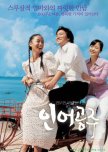
A little gemstone of its own kind
"My Mother, the Mermaid" is a KMovie gemstone. Old school it may be, however offering a sweet and empathic, yet down to earth (love) story without any polish, instead with a little bit of magic mixed in. Overall, the KDrama is ruthlessly rooted in the normality of a fairly simple (and also very South Korean) life.The most important about "My Mother, the Mermaid": A fantastic Jeon Do-yeon in her double role, a Go Doo-shim in top form, authentically rustic Haenyeo and Jejudo flair of the 1980s and the 'wonder´-ful story about a daughter, Na-young, getting to know more about her rather brash mother and her great love - Na-young's emotionally rather absent and ultimately disappeared father.
Sometimes there are worlds dividing (happy moments in the) past and (perhaps quite sad, desolate) present. But even if the present may now look completely different and happiness may seem to have long been lost, the happy, beautiful moments of the past somehow live on, well protected and guarded within the heart.
And sometimes we may evaluate a situation, a person or a relationship completely incorrectly or at least completely inadequately. Simply because we don't know everything yet...
The KMovie turns out to be an almost tender encouragement to approach life a little more humbly and calmly: Less judging and evaluating - because it kills the moment between here and now. Being open more often - because in doing so we give life a new chance with every moment.
-----------------------------------------------------------------------------
SIDE NOTE: --- On time, context and background ---
The KMovie from 2004 begins with a sequence that is set in the past during Asian crisis (late 1990s) - the son is inheriting his deceased father's debts... in that case however, his money mainly comes from his wife...
At first we can't understand why the mother insists so much that her large share of money she brought into the marriage was earned by herself and belonged to her, not him - and why it is so important to her that it was intended for her daughter's studies...
…The protagonist's mother was Haneyeo on Jejudo Island. These women of the sea – 'mermaids' – may not have had any formal school education in the past, but they always earned well because they dive for the sought-after, expensive seafood on the deep seabed and harvest it laboriously by hand with their spatulas. (Until today apparently only women can do this freediving job well.) The Haenyeo are people of respect on Jejudo, not least because of their financial independence. They are perhaps the only truly self-confident women in South Korea who are traditionally respected to this day and also have a naturally developed self-esteem as women (not just as potential wives!)...
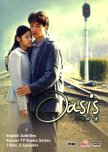
Close to the protagonists - format may be 'old', but script is round, coherent and flawless
I stumbled across "Oasis (2003)" or "Desert Spring" in the context of "Oasis" from 2023. I was curious if there were any parallels (besides the title). There are. Whether they are random or not, I don't know though. The 1940s/50s (in "Desert Spring"), like the 1980s/90s (in "Oasis"), are neuralgic phases of liberation from oppression in recent Korean history. HERE the last years of the Japanese colonial era and the Korean struggle for independence as well as the time under the occupying powers (e.g. USA) form the framework of the story, THERE the time of the dictatorship in the face of an increasing democracy movement. HERE it is radio, music and broadcasting, THERE film and cinema, that open up space for hope, visions, resistance and dreams. Here as there is a rival (who is HERE written more three dimensional than THERE) who refuses to see that the heart of his beloved already belongs to someone else. In both cases, the rival is on the side of power. In both cases the male protagonist is a talented but penniless young man who is in danger of getting underneath the wheels of the influential. Here as there, the female protagonist is a patent woman who knows what she wants.Apart from that, however, many things are different. In particular, the narrative style in "Desert Spring" is a lot more poetic, more visually impressive and with the camera emotionally closer to the protagonists than in "Oasis". Style and format may be 'old', but the script is round, coherent and flawless. HERE (more than THERE) the feelings (and struggles) of the two leads for each other take up most of the space. Almost the entire first episode tells the budding relationship between the two leads in impressive, emotional scenes with plenty of ambience of that time. The time from childhood to adulthood is sensitively sketched without many words. The sequencing and entanglement of events is suggested rather than worked out. However, the story is always close to the two young people who gradually come closer to each other over the years through a chain of coincidences. HERE the way to go is the goal. This was always against the background of Japanese colonial rule, the Korean followers on the one hand and the underground struggle for independence on the other. Music and radio form the context in which the two protagonists develop, prove themselves and finally meet and commit to each other as man and woman. But they don't live in a vacuum. For various reasons, Gi-hyun is a thorn in the eyes of the pro-Japanese collar & tie-wearers from the executive floor. Suddenly, Gi-hyun is on a red list. And even the end of colonial rule does not erase the past.
The KDrama only has three episodes, but they pack a punch. The third actually comes as a double pack with two hours. Impressively told, the story definitely leaves its mark. Even if the leads may not be so familiar to Western audience (compared to superstars from the newer KDrama productions), at least Song Il-gook has cult status in his own country, since "Jumong" at the latest.
A KDrama that uses creative means to reappraise a piece of bitter history in passing while telling a touching love story.
I stumbled across "Desert Spring" almost entirely by accident. Thanks to "Oasis" (2023) I found "Oasis" (2003). At this point, my sincere thanks go to the KDrama "Oasis" (from 2023), because without this reference to the namesake, the more than 20-year-old 'precursor' would certainly not have fallen at my feet.
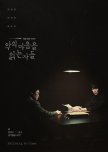
Facing the dark side of humanity. Slow Food for Thought. Intense. Powerful.
"Through the Darkness" takes an experimental approach within the crime genre. It is the serial adaptation of the autobiography of the first South Korean specialist in criminal psychology case analysis, Kwon Il-yong - about his pioneering work in the profiling of serial killers. His extensive research work was inspired by the methods of his American role model Robert Ressler of the FBI's Behavior Analysis Team, who also contributed to the introduction of the term 'serial killer'. The original title is "Those who read in the hearts of evil". Accordingly, the story essentially revolves around the approach of the young investigator to a 'new' form of criminalistic work: tracking down serial killers and their motives, backgrounds and intentions differs from the police work that was common up until then (1990s), since the selection of their victims appears at first glance to be arbitrary, motives are not immediately apparent and their 'gain' in the act is mainly of a psychologically peculiar nature. In order to be able to understand these psychological processes, a database of known psychological offender profiles first had to be created on the basis of comprehensive behavioral analyses. There is a lot of hard work behind it. It took a good decade before a separate unit for operative case analysis based on the American model could be created in South Korea, too - despite a great deal of opposition."Through the Darkness" is about approaching the darkest, most abysmal world of feelings and thoughts of the most brutal serial killers. While the story is also experimental in terms of pioneering the profiling itself, as far as KDrama goes, I mean mostly the way the real cases are processed and presented. There is no superficial plot about the story of the protagonists (let alone a romance). Nevertheless, relationships among colleagues develop over time. It is not 'suspenseful' in the sense of a thriller, because the perpetrators are always known in advance, at least to the viewers. Together with the investigative team, however, we set out to learn to understand the behavior in order to get a 'grab' for the investigation and arrest. This is quite fascinating and captivating. Inevitably, the viewers also enter the psychic worlds, which seem to be devoid of any humanity, and learn to grasp the pattern of loose threads.
In the beginning, the perpetrators were also just people (and not monsters). Not any longer though? When did something decisive change and why? The existential questions and the confrontation with his own darkness, which the protagonist is forced to face during his field research, do not go unnoticed by the viewers either. Kim Nam-gil embodies the lonely path of the profiler in a minimalist, haunting, and compelling way. Thrilling! But not exciting in the classic sense. Powerful. Deep. Slow Food for Thought. Highly valuable. But to be enjoyed in moderation (risks and side effects for the minds of those who 'read the hearts of evil' cannot be ruled out...).

A balanced mix of pleasant feel-good with sad life challenges and social grievances
"Castaway Diva" tells the story of a musically talented young girl with a very deep passion for a particular South Korean singer and her nationally acclaimed songs. “Castaway Diva” also tells the story of a lifelong childhood friendship.The plot summary implies a survival challenge with the promising scenario 'lonely girl for 15 years on a desert island'. Survival challenge may be the topic, but as far as the protagonist´s years alone on the island is concerned, the KDrama spends only a comparably short time on that aspect. It is rather about the (lifelong) challenge of ´some´ to survive their family burden...
'15 years on a lonely island' (however - don´t be mistaken - not in the South Seas or anything like that...) is a nice, original hook that once again introduces us to an attractive side of South Korea (in you like, there is a see side note below). Those years on the island basically form the cleverly knitted background for a firm, characteristically differing profile of a young woman who is intelligent, but comparatively not as consistently socialized in South Korean society and its strong traditions as the rest of the population. Due to her youth, which was for 15 years free of parental upbringing, school instruction and social comparison, yet inevitably well-grounded in everyday survival in the great outdoors, the protagonist brings refreshing clarity, simplicity and directness back to the modern lives of those around her in South Korea 2023. With her almost at the same time naïve and outrageous freedom in thinking and acting, the FL conveys independence and self-reliance in the midst of a society dominated by class, hierarchies and patriarchal family structures. In the midst of modern South Korean society, she hasn´t lost her authentic, creative spirit along the tiring path of competitive education while growing up. She is not, like so many others, gagged by acquired decency, and certainly not disillusioned or frustrated. She impulsively acts on instinct and follows her heart. This has worked for her so far, e.g. surviving her time on the island (and largely overcoming her childhood experiences, too.)
Within this framework, the KDrama is embedding the issue of domestic violence. In fact, this unfortunately still quite widespread, extremely sad problem is dramaturgically tackled in a resolute, rather offensive manner. This topic in its frighteningly powerful might is actually the source of the story´s suspension that runs through all 16 episodes in a tirelessly consistent, incredibly sticky manner…
And the music... yes, the music... This always becomes a balm for the soul. Even if competition in the music business might interfere here and there, music as such inevitably brings heart and soul together. The music brings light into the darkness. For the story overall it becomes the source of life force and healing, too. (Regardless, whether I personally dearly like the songs or not.)
So actually, “Castaway Diva” has quite something to offer. A KDrama that (for a change) isn´t set within the world of the fashionable upper class, and doesn't target the usual RomCom style (however, doesn´t dare to do without it either... well.). Instead, “Castaway Diva” is facing common life with its socially problematic issues in a fairly grounded way and in the process tells a likeable, bright story.
In would recommend "Castaway Diva", if you do not want it to be that intense, yet nonetheless some (easy to digest) profoundness is desired, too. Despite the commotion, with this KDrama an overall positive radiation prevails, i.e. thanks to the consistently positive charisma and straightforward demeanor of Park Eun-bin (- as well as Lee Re as young FL.)
I consider the heartfelt development dynamic of the relationship between the two women - the fan and her star – to be quite felicitous. As is the affectionate patch work family vibe. And always inspiring, the cheerfully thrown in bits and pieces of wisdom that life in nature (as opposed to school education) has taught the FL...
Overall, a balanced mix of pleasant feel-good with sad life challenges and social grievances.
-------------------------------------------------- -----------------
SIDE NOTE:
--- Stranded on one of the 1,000 islands in the southwest of South Korea (and NOT somewhere in the South Seas...) ---
In the Yellow Sea in the southwest of the South Korean peninsula, there are well over 1,000 islands of different sizes. Many of them are downright mini and not even inhabited. It might happen that no one sets foot on one of them for decades.
In recent years, between some of the larger inhabited islands bridges have increasingly been built. Yet, many of them can still only be reached by water. On the islands you can find an ecosystem with virgin forests, wetlands and mudflats that has remained largely untouched by modern human life to this day. Accordingly, this region of 1,000 islands, which extends to over 3,000 km², is now listed as a UNESCO biosphere reserve.
Life between ebb and flow is determined by agriculture and fishing. Thus life is simple, slow, and for some people rather boring. Accordingly, the young are leaving... and the region is overaging.
However, the gifts of nature offer pure abundance. Fishing is often done with bare hands. Mussels and crabs can be collected from the mudflats. Mung beans, soybeans, sweet potatoes, rice, chili and sesame grow abundantly. There are also a variety of findings you can collect on the beaches. You might literally stumble upon small and large treasures. For several centuries, trade with the West took the route through the Yellow Sea. After heavy thunderstorms, many ships have capsized over time up to this day. This is why the maritime region has now been officially listed as a historical site. Deep sea diving for treasures from the Song and Won dynasties of the Chinese Empire, which have been well preserved in shipwrecks in the salty mudflats, has therefore become quite popular. (The FL in "Castaway Diva", however, is more interested in the very mundane, modern flotsam that keep washing up on shore after thunderstorms...)
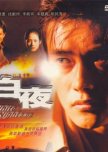
North against South. One (if not the first) Spy-KDrama, atypically action-packed… but hard to get
In 1998, "White Nights 3.98" as a TV production for the first time ventured into completely new territory - not only spatially but also in terms of content. It is about the espionage activities related to the development of advanced nuclear weapons, as well as conflicts between the United States, Russian secret services and mafia, which are carried out on the backs of North and South Korea. The title "White Nights 3.98" on the one hand refers to midsummer nights in northern latitudes and thus to the scene of action: Mongolia. On the other hand it relates to the supersonic flight speed measured in the ´Mach´. Here '3.98' denotes the speed at which one of the protagonists is traveling in a key scene.------------------
As a child, Min Gyeong-bin had actively witnessed the heroic death of his father, who was able to foil the assassination attempt by North Korean Unit 124 on President Park in 1968 while deployed by the Jongro police. His childhood dream is to become an Air Force pilot, dancing through the air at high speed. Gyeong-bin actually manages to be trained as a pilot, but due the circumstances he ends up being deployed to the secret service. His target is nuclear researcher Anatoly Jang, who is deputy director of the Institute for Atomic Energy Research in Irkutsk, Russia. The FSB, the Chechen mafia and the North Korean secret service are also interested in him, secret information and the latest generation of nuclear bombers. The Nort Koreans mobilize one of their best snipers: Kwon Taek-hyeong.
Taek-hyeon's father was part of Unit 124 at the time. As the black sheep of his family, Taek-hyeon usually had a hard time. After helping his first love Anastashia to flee south through the Imjin River as a teenager, he also lost his heart along with her. He learned how to shoot as a soldier, and as an unscrupulous sniper he can now be bought around the world - including a terrorist rebel group in the Arab world, far from home. Now, however, he is hired by his own people. He's supposed to eliminate Anatoly Jang. Far too late he realizes his target being the father of his first and only love, who in turn is now an agent of the Russian FSB...
-------------------
This KDrama is atypically action-packed: with flight scenes reminiscent of Top Gun, a trigger-happy sequence where the North Korean protagonist shoots himself free in Rambo-style, underwater scenes in the Imjin River (that flows through the demilitarized zone), explosions, and more. The KDrama actually opened up a spectacular new genre in the South Korean series world. And yet. "White Nights 3.98" had a difficult stand in South Korea in several ways. Ratings started high and then plummeted.
There are several reasons that tell us more about South Korea, than about the KDrama. "White Nights 3,98" is based on the novel of the same name and is an exciting and thoroughly entertaining, at times well-done as well. It is also documenting, that in spite of Cold War having already ended, North and South Korea with their particular political dynamic represent the last and still red-hot stronghold of a Cold War that is actually still going on. However, the KDrama comes to TV at a time when the North and the South just startet to look to the future with more optimism, with their hopeful, positive "sunshine politics" and the newly created Kŭmgang-san region dedicated to South Korean tourism in North Korea. "White Nights 3.98" might present a hot topic that is always up to date, though it completely missed the social topic of the time. People didn't really feel like giving their hearts to warring spies - North against South. So even though at the beginning, the series was still in third place, its ratings rapidly went down.
There is another reason for this. A considerable part of the scenes (3 out of 12 months of shooting time) were shot abroad, mainly in Russia and partly in Uzbekistan. This brings exotic flair to the series orbit, which in KDrama is otherwise concentrated on the peninsula. (Compared to other KDramas, the total production costs were accordingly three times as high.) However, the international subject matter, the dramaturgical interdependence with the secret services of the USA and the Soviet Union, also required native speakers who could easily find their way around the South Korean set. It repeatedly seems to be a problem to find a suitable cast - a problem that I already encountered in "Sad Love Story". Eventually, the acting performance of the Russian and American casts can´t keep up with the rest of the production. That's really a shame, because it not only offends the eye, but also the ear.
Yet, the production had to take another criticism. Director Kim Jong-hak, who excited the masses with "Sandglass" just a couple of years before, now caused offense by working with deliberate reminiscences of that earlier production - with similar or even the same scenes. One or the other seemed strangely familiar to me, too. But those who don't know "Sandglass" won't mind. And even so, it doesn't really have to bother. Nevertheless, it was not well received as a 'gag' at the time. The South Korean audience was 'not amused' about it.
Additionally, criticism referred to the rather sloppily drawn central character Kwon Taek-hyeong. In the original novel, the protagonist, who is difficult to grasp, is probably a lot more understandable in his ambivalence and complexity. The series massively simplifies/slims his profile. There is comparatively little left of his dark, evil, unscrupulous side in the script. Little remains of his ambivalence either. You also learn practically nothing about that background. Finally, the story of how he went from being a teenager to an unscrupulous terrorist is simply left out. Only the painful loss of Anastashia remains. In the series version, Choi Min-soo had to make up for a few things with his presence in order to convey a strong profile to this tragic character.
"White Nights 3.98" may be a spy thriller, but it's not a about male heroes only. There are plenty of women involved as events unfold. Of course, there are also tragic entanglements in love. Ultimately, the driving dramaturgical forces are not ideologies, people and homeland, but heart and pain, impulsive and human decisions. Whatever one may accuse "White Nights 3.98" of, it comes up with strong emotional moments in the proven KDrama manner.
By the way, here you can see Park Eun-bin making her acting debut as a six-year-old, and Song Hye-kyo was still in the starting blocks of her career back then, too... if ever you get to see the KDrama. With subtitles it is (currently) difficult to get...
----------------------------------------
Historical SIDE NOTE:
For me, in connection with "White Nights 3.98" (besides all the entertainment and star encounters), the historical context was ultimately interesting - not only in relation to the contemporary critical reception of the KDrama, but also regarding the true historical prelude storyline:
In 1968, North Korean Special Forces attempted to assassinate South Korean President Park, thus a special ´Unit 124´ had advanced as Black Op on South Korean soil. They had dived through the iced Imjin River and left the demilitarized zone behind. On their way to the Blue House, 7 km east of Paju, the group was spotted by four passers-by and reported to the police. However, the special unit was prepared for this and changed into the uniforms of the local 26th Infantry Division of the South Korean army and split up. Unnoticed by the police and military, they were able to penetrate as close as up to 100 m to the Blue House in Seoul. However, by chance or good intuition of the local police chief, the assassins were confronted at Checkpoint Jongro and engaged in a shootout. 29 of 31 members of the special unit died trying to escape or killed themselves as a precaution. One of two survivors was caught and defected to the south. The other, Pak Jae-gyong, made it back to North Korea and to the top of the military and political ranks.

Be ready for a comprehensive script and excellent actors everywhere
Spreading its unique, quite appealing, and in places wittily pointed charisma, "Delightfully Deceitful" surprises with a multi-layered crime fiction, that is set in the milieu of people with extraordinary talents and qualities. Even if the poster may suggest otherwise: it is not a romantic comedy. However, "Delightfully Deceitful" does neither shy away from a little comedy here and there, nor from finely nuanced emotions.At the beginning there are the personality portraits and relationship dynamics of a bunch of (because of their distinct peculiarities) 'a-social' contemporaries, who as such being colorfully thrown together eventually form a group of their own. With time, though, the plot of the crime story unfolds, raising once more the question of whether law&order have anything to do with justice; or isn´t vigilantism more promising? In any case, the story revolves around organized crime, unscrupulous villains, malicious fraud and a lot of money.
Nevertheless, there is this bunch of idiosyncratic, unconventional, angular chessmen on the chessboard. Regardless of whether they are psychopathic, sociopathic or hopelessly empathetic, they are all rarely black or white, yet mostly in rich shades of gray. In any case, with their talents they are beyond the social average. While the KDrama could very well surface along at high speed, with a cool and casual esprit, it eventually comes along with a pleasantly profound grounding, since the socio-psychological premise , that we humans are inevitably social beings, swings the baton in the background. The thing is: we want to belong.
Exposure, stigmatization and exclusion also lead to the realization that the rules of the others do not apply to me. This might become associated with some kind of freedom. It also leads to a feeling of loneliness. Yet, the feeling of loneliness inevitably causes humans to slowly but surely wither away. No matter if it may be considered a gift or a burden, stigmatized individuals have to develop a emotional strategy for themselves in order to escape the sometimes more and sometimes less obvious psychological strain. That’s tough for grownups, let alone children...
This premise is handled from different perspectives. Additionally, the KDrama dares the balancing act of mixing this psychodynamic issue with no less complex interwoven crime fiction. Thus, in terms of the genre, the story may initially sail along in foggy realms, but over time the view becomes clearer.
"Delightfully Deceitful" has a well blended mix of spices to offer. Over 16 episodes it is always exciting, intense, opaque, emotional, also dark, sometimes two-fisted. Additionally: Be ready for a comprehensive script and excellent actors everywhere.
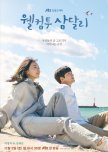
Pleasantly warming and inspiring, like a cup of tea that you may enjoy sip by sip
Once again a wonderfully authentic KDrama with amiable characters, who are living a live just like any South Korean life could be. The KDrama is neither captivatingly suspenseful nor does it urge to be devoured in one go. Instead, it's rather pleasantly warming and inspiring, like a cup of tea that you may enjoy sip by sip. The story could always go on as everyday life is - in Jejudo and elsewhere (in the province).At first glance, “Welcome to Samdal-ri” is a sweet Rom+Com and, in passing, it is also a declaration of love for Jejudo, the largest South Korean island. At second glance, however, the KDrama also delivers a lovingly drawn and yet time-critical image of society, in particular of a generation that is struggling to balance between archaic roots and home on the one hand as well as global, urban & digital lifestyle values on the other.
In general, lifelong friendship can be considered the overarching theme. The peer group as a family of choice in the sense of a community of fate, whose commitment has been growing from the inevitable spatial proximity of a village community - here: Samdal-ri.
Specifically, the story is about such a lifelong friendship between two friends, who at some point naturally became a love for life, yet without automatically being able to be lived as such.
As so often, it´s about family with its particular momentum, mingling as centrifugal and as pulling force, too.
Refreshing, soft and tangible: Shin Hye-sun and Ji Chang-wook. But overall, "Welcome to Samdal-ri" offers great casting in all positions.
Enjoy your tea time...
---------------------------------------------------------
SIDE NOTE...
...on "Welcome to Samdal-ri" offering a felicitous, good-humoured and optimistic time-critical image of society
On the one hand, the monotonous everyday life in the provinces just glides along. In “Welcome to Samdal-ri” the social tightness of the village structure is intensified by the island situation on Jeju-do. Binding village life in its everyday occurrences may be boring for some, while reliably familiar and pleasantly manageable for others. Rhythm, rules, community - everything is well-arranged. You can count on being safely caught by a social net that is protecting, warming. However, it comes with a price: a naturally intrusive social environment that would like to have a say everywhere...
On the other hand, the shimmering metropolis of distant Seoul is attracting the young with its wide world full of fashion, culture and lifestyle, promising individual fulfillment in a varied, anonymous, fast-paced, entertaining, colorfully inspiring, glittering city life that bears the stamp "successful". But this has its price, too, as the KDrama clearly shows with various examples. Fast-paced, cool big city life is mostly superficial, curt, nonbinding, aloof and mercilessly leaving you out in the cold.
Gossip apparently seems to be for us humans naturally coming with our anthropological cradle… Whether city or countryside, whether Seoul oder Samdal-ri, it is everywhere - the KDrama is cleverly using this as a dramaturgical bridge between the two worlds...
In a village with an intrusively curious neighborhood like Samdal-ri, where almost nothing can be kept secret, gossip adds spice to an otherwise uniform everyday life. However, it turns out, globalization and digitalization have by now raised village gossip to an unimagined, even more threatening (since anonymous) level. Rumors multiply virally in the form of social media posts shared at lightning speed, thus turning Seoul into just another (digital) village, yet on a global scale - with the effect that the brutal force of the impact far dwarfs that of a rural, analogue village. Once a rumor like this has started, it's hard to stop it and it's practically impossible to undo it. The anonymity of a viral rumor mill also invites hateful comments, the existential consequences of which no one seems to have to take responsibility for. Never mind whether there really is something to it or not… no one is interested anyway.
In the worst case, self-imposed exile from the analogue village offers an opportunity to escape social pressure at least. The digital village of the globalized new world, however, no longer shows any mercy. It's everywhere... there's no escape...
The uncontrollable social media with its enormous power as well as the largely non-binding, superficial encounters of an anonymous urbanity are juxtaposed with the archaic themes that continue to shape life on Jeju-do today - and thus the roots and grounding of its people. Eventually, "Welcome to Samdal-ri" tells of the dominance of tides and weather shaping everyday life; of the power of the sea, which continually takes its toll; of the lives of the Haenyeos diving for abalone and more - day after day, year after year; of the Haenyeo families, following the mother as the strong head of the family; and even of bloodguilt that turns friends into enemies, urging to pass this feud on from generation to generation.
Although life in the provinces may seem archaic, tight and boring, not everything automatically has to be wrong or bad. Nevertheless, young people increasingly and understandably prefer to go to Seoul. They want to leave the dusty roots and rigid structures behind. They prefer to live at the center of the vibrant new South Korean world instead.
But even if they leave their village home for individual fulfilment, psychologically they are still far from finding their way back to themselves. And even if Seoul has such a promising, almost magnetic, electrifying, cosmopolitan charisma, the capital, along with the temptations of big city life, also harbors a fatal seed, that many have not expected: Betrayal! Betrayal of oneself (and/or eventually betrayal of others...) For most people sooner or later this seed will be sprouting, if they lose their grounding along the way - if they simply radically cut off their roots instead of finding ways to continue to nourish them...
As such I appreciate "Welcome to Samdal-ri" offering way more than a Rom+Com - e.g. a felicitous, good-humoured and optimistic time-critical outlook on contemporary issues within modern society.


 9
9 38
38 15
15
















